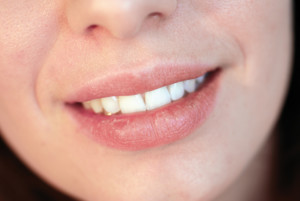Each year, the American Diabetes Association sponsors National Diabetes Month in November to raise awareness of the disease and all the ways it affects sufferers and those around them. Currently, 29 million Americans have diabetes—that’s 1 in 11, with another 86 million at risk.
Diabetes affects many aspects of a person’s health, and the mouth is no exception. So, to do our part in helping to raise awareness, we’ve put together a list of 5 ways that diabetes affects your oral health.
1. Gum Disease

Human denture on dental treatment – part of beforeafter series.
People who have diabetes are at a greater risk for gum disease, especially if their blood sugar is not under control. High levels of glucose in saliva help bad bacteria to grow, which leads to the formation of plaque. Left unchecked, plaque can cause cavities and gum disease.
The best way to prevent gum disease is to keep your blood sugar levels stable, brush and floss daily, and keep on track with regular cleanings at the dentist.
2. Change in Sense of Taste
In some cases, diabetes can change or diminish the flavors of the food you eat. Unfortunately, one of the most common changes is an impairment in tasting sweet flavors, which can cause diabetes sufferers to eat sweeter foods. A diet higher in sugar often leads to cavities, tooth decay and other oral health problems.
If you notice a reduction in your sense of taste, try to make up for it by adding flavor to foods with spices rather than sugar—your teeth will thank you for it.
3. Dry Mouth

Many people who have diabetes also produce less saliva than the average person, causing to a condition called xerostomia, or dry mouth. Saliva is important for oral health because it helps to wash away food particles and neutralize acid, so prolonged or chronic dry mouth can lead to cavities and gum disease.
To fight dry mouth, drink lots of water, rinse with a mouthwash made for dry mouth, and avoid tobacco and alcohol. You can also try sugarless gum or candy to stimulate saliva production.
4. Bad Breath

High levels of glucose in saliva in combination with dry mouth makes for a perfect environment for bacteria to thrive. Bacteria give off foul smelling gases when they digest the glucose in your mouth, which is why many people with diabetes also suffer from halitosis or bad breath.
To prevent bad breath, keep your blood sugar levels stable, avoid sugary foods and drinks, and make sure to maintain excellent oral hygiene.
5. Infections
People with diabetes have weaker immune systems, which makes them more susceptible to infections. The most common mouth infection in diabetes sufferers is candidiasis, better known as thrush. Thrush is caused by a type of yeast that thrives on the sugar in your saliva, and is even more common in people who wear dentures. The most noticeable symptom is a white coating on the tongue and cheeks.
The best way to prevent thrush and other infections is to keep your mouth and dentures as clean as possible. If you think you may have a thrush infection, call us at (540) 434-5500 to make an appointment today.
Help Us Raise Awareness!
Want to help raise awareness for National Diabetes Month? Share this post with your friends on Facebook and Twitter (and be sure to leave us a comment on our Facebook page, too). You can find more information about the event on the American Diabetes Association website.

